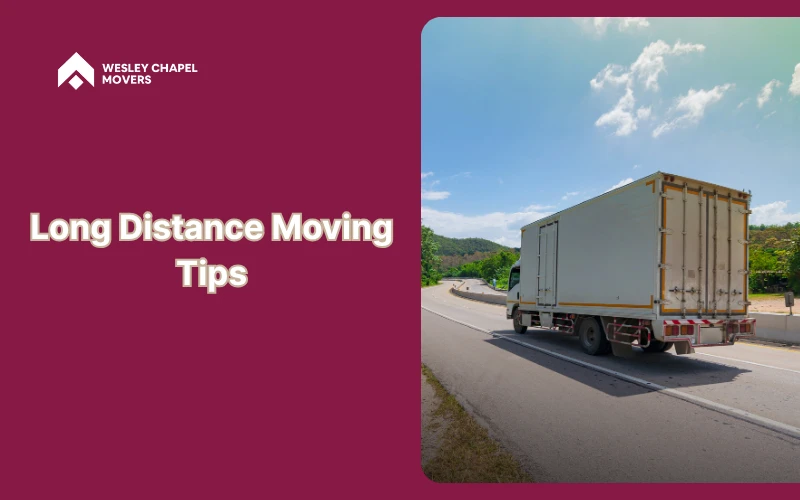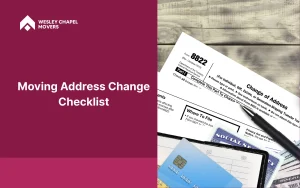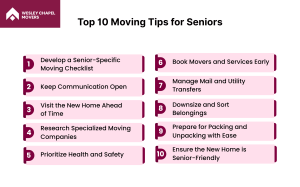To ensure a smooth long distance move, start by planning at least 8 weeks in advance, decluttering your home, getting multiple quotes from movers, and creating a detailed timeline. Since long distance moves are more complex than local relocations, taking early action helps you manage the logistics and reduce last-minute stress.
Planning ahead not only helps you stay organized but also brings peace of mind. By starting early, you give yourself the flexibility to deal with any unforeseen delays or complications. Decluttering before packing allows you to save both time and money, as fewer items mean lower moving costs. Getting multiple quotes from movers ensures you choose the right service at the best price, avoiding unexpected costs later. A clear timeline helps you stay on track and keeps you from feeling overwhelmed by the many tasks involved.
By following these tips and planning well in advance, you will feel more in control and confident, knowing that every step of your long distance move is carefully coordinated.
Planning Tips for a Long Distance Move
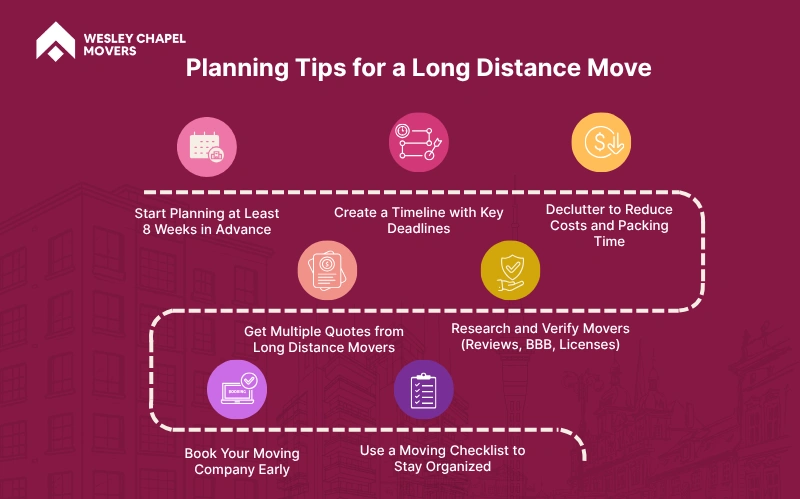
Start your long distance move planning at least 8 weeks in advance to allow time for all the crucial steps, including decluttering, gathering moving quotes, and creating a detailed timeline. Planning ahead helps reduce last-minute stress, prevent budget issues, and avoid logistical failures. Set a moving date, declutter early to reduce costs, and create a detailed checklist. Gather at least 3 quotes from movers, verify their credentials, and book early.
To maintain momentum, consider using digital tools like moving apps (e.g., MoveAdvisor, Sortly, MagicPlan) or printable timelines to stay organized. Studies show that 60% of failed moves are due to poor early planning, so staying ahead of the curve will ensure a smoother and less stressful move.
Start Planning at Least 8 Weeks in Advance
Start planning your long distance move at least 8 weeks before the moving day to ensure you have enough time to handle all necessary tasks. This gives you time to research and get at least 3 quotes from moving companies, check their reviews and credentials, and book early to secure availability. You will also have time to declutter, gather packing materials, and begin packing non-essential items. Preparing your new home, like arranging utilities and services, should also be done in this window. Early planning helps avoid last-minute stress, budget issues, and logistical failures, ensuring you stay organized and can handle unexpected delays.
Create a Timeline with Key Deadlines
Creating a detailed timeline with specific deadlines helps ensure everything is completed on time and that you stay organized. Breaking down tasks by weeks keeps the process manageable and reduces stress.
- 8 weeks out:
Research and get at least 3 moving quotes. Book early and set up utility connections or repairs at your new home.
- 7 weeks out:
Pack non-essential items like seasonal clothes and books. Label boxes and inform family and friends about your move.
- 6 weeks out:
Finalize the moving company, schedule the move, confirm dates, and arrange utility disconnections and setups.
- 4 weeks out:
Declutter and donate unwanted items. Start cleaning areas that will be packed last.
- 2 weeks out:
Pack essentials like clothes, toiletries, and kitchenware. Confirm move-out and move-in dates with movers.
- 1 week out:
Double-check logistics, confirm bookings, finalize packing, and clean your old home.
By following this timeline, you will stay on track, reduce the risk of forgetting important details, and ensure that everything goes smoothly.
Declutter to Reduce Costs and Packing Time
Decluttering before your long distance move can significantly reduce the time and money spent packing, as well as streamline the unpacking process. The fewer items you move, the lower your moving costs will be, and the less work you will have on moving day. To make the most of your decluttering process, go through each room and systematically identify items to get rid of.
- Clothing: Donate or sell clothes you have not worn in a year, including seasonal items like winter coats or summer dresses.
- Furniture: Sell or donate bulky furniture that will not fit in your new home, such as old sofas, coffee tables, or oversized chairs.
- Kitchen items: Discard expired food, spices, and duplicate kitchenware or gadgets, like extra pots, blenders, or outdated microwaves.
- Electronics: Discard expired food, spices, and duplicate kitchenware or gadgets, like extra pots, blenders, or outdated microwaves.
Decluttering before your move not only lowers the cost of the move but also helps make the packing process faster, more efficient, and less stressful. It allows you to start fresh in your new home with only the essentials and items that truly add value.
Get Multiple Quotes from Long Distance Movers
Getting quotes from at least 3 different moving companies is essential to ensuring you receive the best value for both price and service. Each quote should include a detailed breakdown of services such as packing, transportation, loading, unloading, and insurance coverage. It is also important to ask about any additional fees, such as for fuel, tolls, or special handling for fragile items. By comparing these quotes, you can evaluate which company offers the best combination of affordable pricing, services that match your needs, and a reliable reputation. This process allows you to choose a mover that fits your budget while ensuring the job is done professionally and efficiently.
Research and Verify Movers (Reviews, BBB, Licenses)
Before hiring a moving company, it is crucial to research their credibility to avoid scams and ensure you are working with a reliable service provider. Taking the time to verify a company’s credentials can protect you from potential issues during your move. Here is how you can ensure the moving company you hire is trustworthy:
- Check for Licenses: Verify the company’s DOT (Department of Transportation) and MC (Motor Carrier) numbers on the FMCSA (Federal Motor Carrier Safety Administration) website to confirm they are authorized to operate.
- Check BBB Ratings: Look for any complaints or issues reported and check the company’s BBB (Better Business Bureau) rating for reliability.
- Read Reviews: Check reviews on platforms like Google, Yelp, and Trustpilot for consistent positive feedback.
By following these steps, you will ensure you are hiring a reputable moving company that will handle your belongings with care and professionalism.
Book Your Moving Company Early
Booking your moving company 6 to 8 weeks in advance is crucial, especially during peak seasons like summer or around major holidays when demand is high. Early booking ensures you secure your preferred moving date and prevents potential price hikes or limited availability. Additionally, booking early gives you ample time to thoroughly review the contract, confirm services such as packing or special handling, and clarify any additional fees. This proactive approach also allows you to resolve any questions or issues ahead of time, making the entire moving process smoother and more organized.
Use a Moving Checklist to Stay Organized
A moving checklist is crucial for staying on top of all tasks during your long distance move and ensuring nothing is overlooked. By tracking each step, from packing to utility transfers, you can stay organized and on schedule. A well-structured checklist provides clear deadlines and helps you break down the process into manageable tasks, making the entire move less overwhelming.
- Packing: List items by room and set deadlines for each packing phase (e.g., non-essentials first, essentials last).
- Utility Transfers: Schedule disconnections and reconnections for services like electricity, water, internet, and gas.
- Address Changes: Set a date to update your address with USPS, banks, credit cards, and subscriptions.
- Insurance: Update your home, renters, or auto insurance for your new location.
- Pet Care: Add a task to arrange for their transportation, boarding, or care on a moving day.
- Cleaning: Schedule cleaning for your old home after packing.
By following a checklist, you will keep your moving process organized, reduce stress, and avoid scrambling at the last minute. It is a simple yet effective tool to stay in control as your moving day approaches.
Packing Tips for Long Distance Moving
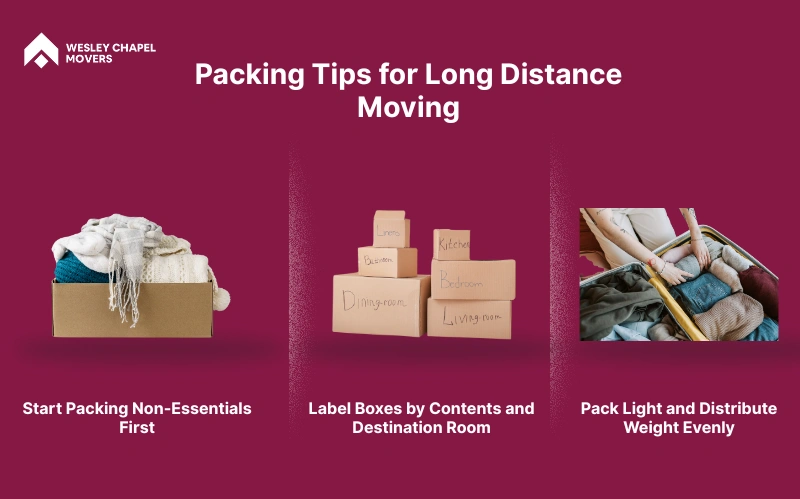
To pack efficiently for a long distance move, start by organizing your belongings and gathering high-quality packing materials. Begin with non-essentials and gradually work your way through essential items as the move date approaches. Pack and label boxes, grouping similar items, and make sure to pack an essentials bag with items you will need immediately upon arrival.
Start Packing Non-Essentials First
Start packing non-essential items well in advance to avoid rushing closer to your move date. Non-essentials are items you will not need in the final weeks before the move, such as seasonal clothes, decor, and extra kitchenware. By getting a head start on packing non-essentials, you reduce clutter and free up space for essential items closer to the move date.
- Seasonal items: Pack clothes and accessories for the upcoming season that you will not need immediately, such as winter coats or summer attire, depending on the time of year.
- Decor: Box up items like holiday decorations, art, vases, or lamps that do not serve a daily function.
- Books, DVDs, and DVDs: Pack entertainment items such as books, movies, and other non-essential media.
- Spare bedding and linens: Pack extra bed linens, towels, and blankets you will not be using until after your move.
Label Boxes by Contents and Destination Room
Labeling your boxes by both contents and destination room is essential for a smooth unpacking process. It helps movers place boxes in the right locations and makes it easier for you to find specific items once you arrive at your new home. This simple step will save you time during unpacking and reduce the chances of misplaced or damaged items.
- Contents labeling: Write down detailed descriptions of what’s inside each box, like “Living Room – Lamps and Decor” or “Bathroom – Towels and Toiletries,” so you can easily identify boxes upon arrival.
- Room-specific labeling: Mark the box with the room it belongs in, for example, “Kitchen” or “Master Bedroom,” so movers know where to place each one.
- Fragile and heavy item markings: Label fragile items with “Fragile” or “Handle with Care,” and use caution symbols for breakable items. For heavy boxes, note “Heavy” on the label to ensure proper handling.
- Inventory list on the box: Consider adding an inventory number on the box and keeping a matching list to track items during the move.
Pack Light and Distribute Weight Evenly
When preparing for a long distance relocation, packing light and evenly distributing the weight across boxes is essential for both safety and efficiency. Overpacking or unevenly packed boxes can make handling more difficult and cause potential damage. Pack heavy items like books or tools in smaller boxes (no more than 40 lbs) to prevent overloading, and balance them with lighter items such as towels or pillows.
Reinforce each box with heavy-duty packing tape, especially for fragile or valuable items. Avoid exceeding 50 lbs per box, and use larger boxes for lighter, bulkier items like clothing or bedding. This strategy ensures your belongings are safely packed and makes the moving process easier for everyone involved.
Logistics and Organization Tips
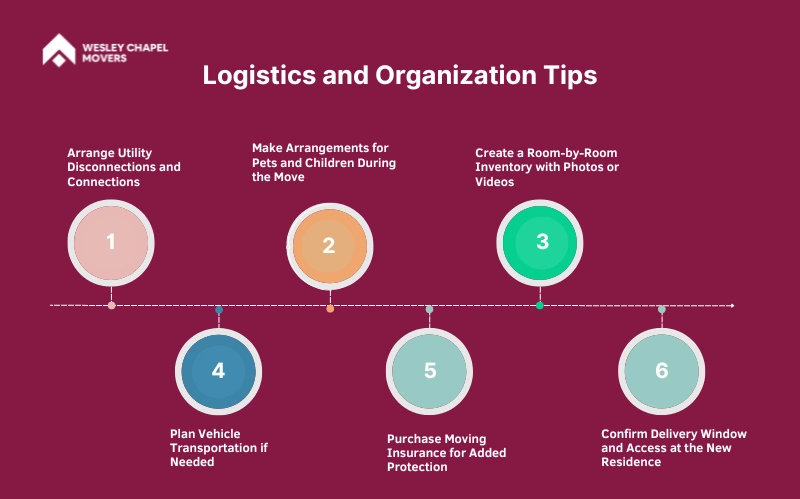
Plan logistics in a long distance move by scheduling utility transfers, updating your address with USPS and relevant institutions, and making arrangements for vehicle and pet transport. Start by disconnecting utilities at your old home and ensuring they are set up at your new home in advance. Handling these tasks ahead of time ensures a hassle-free move and prevents any last-minute delays or complications.
Arrange Utility Disconnections and Connections
Start by scheduling utility disconnections for the day after you move out and reconnections for the day before you move in. This includes services like electricity, water, gas, internet, and trash collection. Confirm dates with each service provider to avoid interruptions and ensure a seamless transition.
- Disconnect utilities: Schedule disconnection of services at your old home, including electricity, water, and gas, for the day after you move out.
- Reconnect utilities: Set up reconnections for these services at your new home a day before you move in.
- Confirm all services: Do not forget to confirm details with providers like internet, cable, and garbage services for both old and new addresses.
Plan Vehicle Transportation if Needed
If you are not driving your vehicle to your new home, arrange for transportation well ahead of your move date. Securing vehicle transport in advance ensures your car will be ready for pickup and delivery without delays. Whether you choose to ship it or have it driven, advance booking will help you secure the best rates and availability.
- Car shipping services: Research and book a car shipping service, ensuring they are licensed and insured.
- DIY transportation: If you plan to drive your vehicle, consider how to prepare it for a long trip, including maintenance and fuel.
- Additional vehicles: If you are moving more than one vehicle, plan transportation for each one separately.
Make Arrangements for Pets and Children During the Move
Moving with pets or children requires special planning to ensure their safety and comfort. Arrange for sitters or transport services to reduce stress for both them and yourself during the move. Proper arrangements will also help you focus on the move while ensuring your pets and children are well-cared for.
- Pet transport: If you are not traveling with your pets, book a transport service well in advance to ensure their safety.
- Pet care on move day: Arrange for a friend or family member to take care of your pets while you are packing or during travel.
- Childcare during the move: Have someone look after young children or plan their care during the most hectic parts of the move.
Purchase Moving Insurance for Added Protection
Purchasing the right insurance gives you peace of mind, knowing your items are protected from potential damage or loss during transit during a long distance move. Basic liability often does not cover the full value of your items, so opting for full-value protection or third-party insurance ensures you are adequately covered in case of damage or loss.
- Released value protection: This is the default coverage provided by most movers, offering minimal compensation, usually $0.60 per pound per item.
- Full-value protection: This option provides more comprehensive coverage, reimbursing you for the replacement value of any lost or damaged items.
- Third-party insurance: For high-value items, consider purchasing third-party insurance to cover expensive or irreplaceable belongings.
Create a Room-by-Room Inventory with Photos or Videos
Creating a room-by-room inventory with photos or videos ensures you have a record of all your belongings, which can be crucial for filing insurance claims or tracking any missing items after a long distance relocation. This step also helps you stay organized during the packing and unpacking process.
- Room-by-room inventory: Go room by room and list the items you are moving. Take note of the condition of furniture, electronics, and valuables.
- Photographs and videos: Take clear photos or record videos of each item, including close-ups of any damage or wear. This visual record can help in case of disputes or claims.
- Track valuable items separately: Keep a separate inventory for high-value items, including serial numbers and receipts, to ensure they are covered under your insurance policy.
Confirm Delivery Window and Access at the New Residence
Confirming the delivery window and access details at your new home is vital for avoiding delays or complications on move-in day. This ensures that your moving company can unload your belongings on time and without issues.
- Delivery date confirmation: Double-check the delivery date with your movers to avoid any last-minute surprises or scheduling conflicts.
- Access to the new home: Ensure that the moving truck will have access to your new home. If you are moving into an apartment, confirm elevator reservations or parking permits with the building management.
- Narrow access points: If your new home has narrow roads or limited parking, discuss alternate drop-off options with your moving company.
Why Hiring a Professional Moving Company Matters in Long-Distance Moves?
Hiring a trusted Professional moving company is essential for ensuring your long-distance move is smooth, efficient, and secure. With the complexities of moving, including the logistics, packing, and transportation, the last thing you want is to worry about who’s handling your valuable belongings. A licensed, insured, and locally recognized moving company provides you with the assurance that your move will be in capable hands, reducing risk and stress.
Here are the key benefits of hiring a trusted local moving company:
- Local expertise: Knowledge of local traffic patterns, building codes, and ordinances allows movers to plan the best routes and avoid potential delays.
- Faster communication: A local company can offer quicker responses and personal support, giving you direct access to your moving team throughout the process.
- Insurance and liability coverage: Trusted movers provide verified insurance, ensuring that your items are protected from damage or loss during transit.
- Transparent pricing: With a local moving company, you will receive clear, upfront pricing with no hidden charges, making it easier to budget for your move.
- Professional handling: Experienced, licensed movers are trained to handle your belongings with care, reducing the risk of damage or mishandling.
- Cross-state compliance: Local, licensed movers ensure your move complies with state and federal regulations, providing peace of mind that everything is handled legally.
At Wesley Chapel Movers, we offer all the benefits you need for seamless long-distance moves. With years of experience, we specialize in local and long-distance relocations, providing packing, moving, and storage services tailored to your needs. Our clean, well-maintained trucks and trained professionals ensure the safety of your belongings. We provide transparent, competitive pricing to make your move stress-free, whewther you are relocating across the state or the country.
